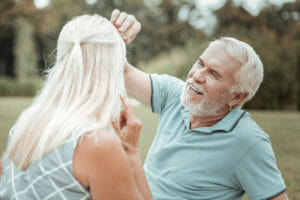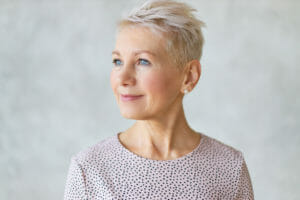What’s The Connection Between Self Esteem and Hair Thinning At Menopause?
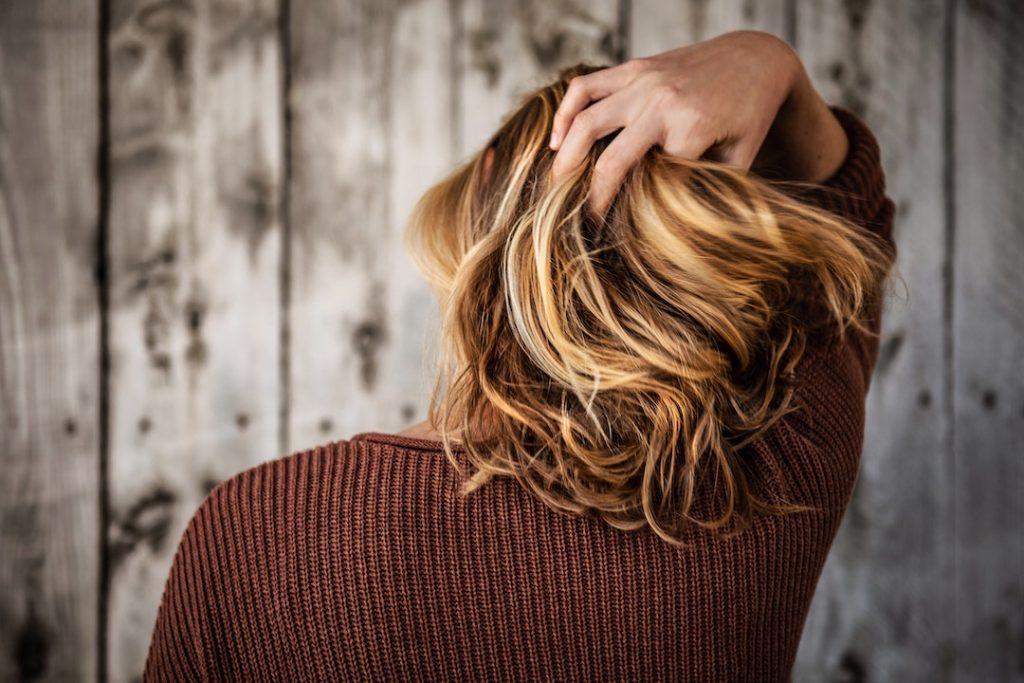
One of the not-so-often talked about side effects of menopause is hair thinning or hair loss.
Is your hair thinning?
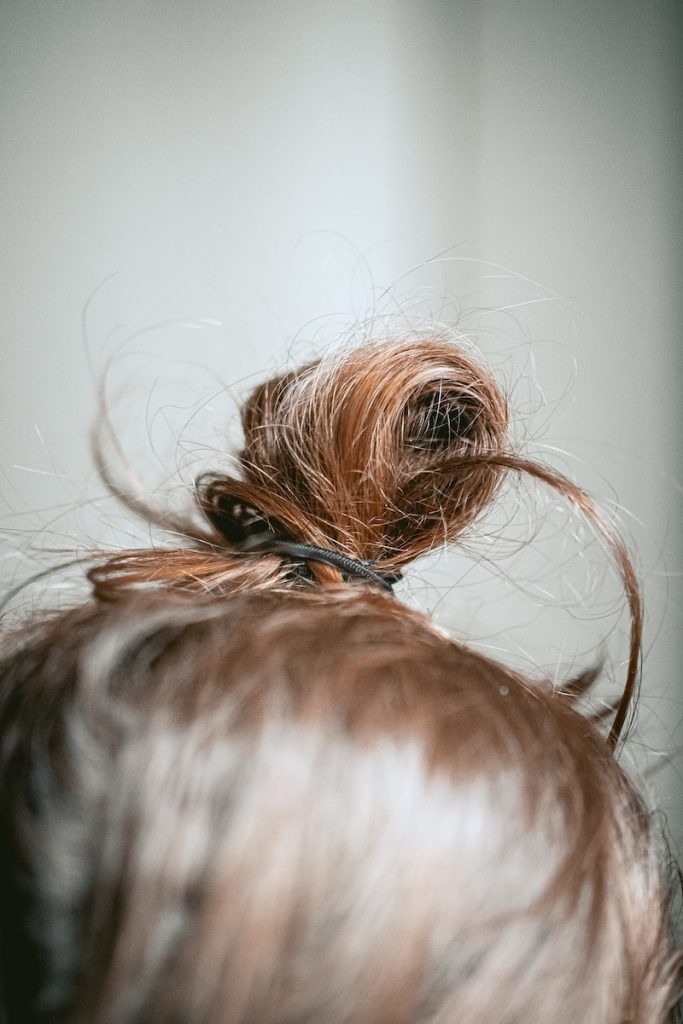
Have you looked at your hairbrush lately and noticed it seems full of hair?
Even though you de-haired it not long ago?
Or perhaps you habitually wear a ponytail and you’re certain it seems thinner?
You’ve never measured it but you could swear it used to have more volume.
No matter what age you are it’s normal to shed about 50 to 100 hairs a day. This is because individual strands can be at a different stage of the hair cycle. However, if you’re noticing you’re losing more than this, you could be experiencing hair loss.
Stages Of The Hair Cycle
Hair grows in three stages:
Anagen
The growth phase is when the hair is growing in and from the follicle which lasts for about two to seven years.
Catagen
The catagen stage is the resting phase. It’s when the hair cycle is paused for approximately two weeks as it prepares to shed.
Telogen
When the growth phase completes, the strand of hair sheds. The follicle takes a rest for about three months before sprouting new hair.
The pattern of the above hair cycle can change during perimenopause in the lead up to menopause itself. As a result, you may notice your hair’s a little lacklustre – the condition, texture and volume changes.
Furthermore, it may not take as long to dry your hair or colour it (if you do).
Additionally, some women will experience a widening part line and noticeably thinner hair at the crown. This is known as female pattern hair loss or FPHL.
What Is Female Pattern Hair Loss?
The technical term for female pattern hair loss is androgenetic alopecia and it causes hair follicle shrinkage or miniaturisation. As a result, hair strands become finer and fewer hairs will be in the anagen (growth) stage.
Why does hair thinning occur at menopause?
There are multi-factorial reasons for hair thinning at menopause.
Causes of hair thinning:
- Genetics
- Growing older
- Hormone level changes
- Thyroid issues
- Lifestyle
- Medications
- Nutrition – iron and vitamin D can play a big role
- Stress – stress-related ‘shedding’ related to illness, grief or over-dieting
Hormonal changes and hair thinning:
Hormonal changes in perimenopause and post-menopause mean your sex hormones including estrogen, progesterone and testosterone drop.
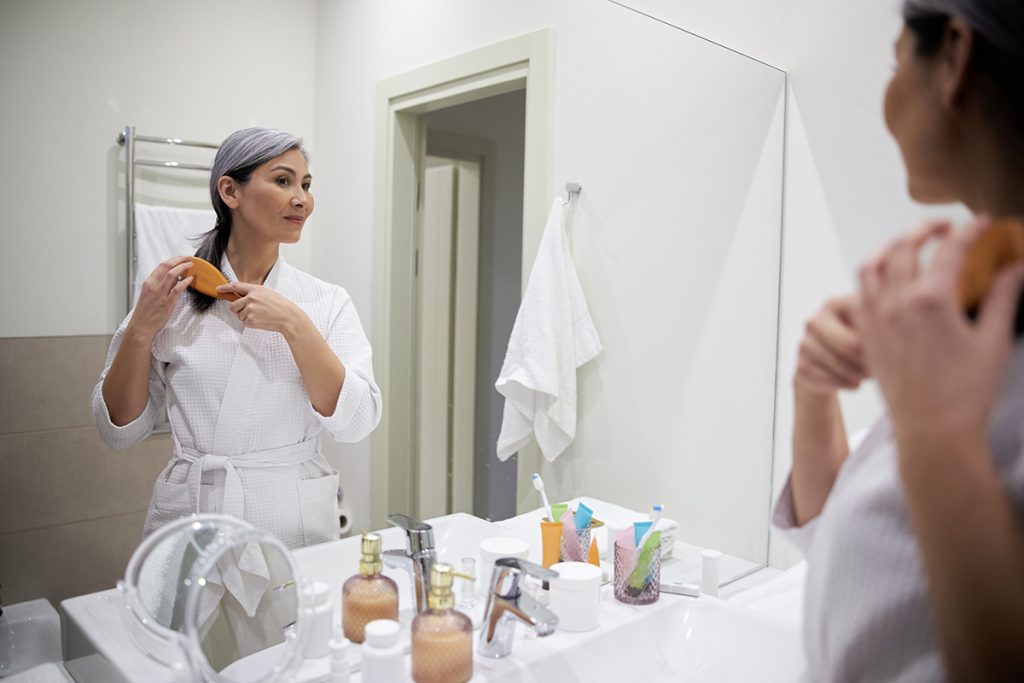
Declining estrogen causes hair to grow more slowly, and shrinking follicles make the hair look visibly thinner. What’s more, estrogen helps hair grow faster and keep the hair on the head for longer.
Androgens such as testosterone and androstenedione are typically thought of as male hormones but they play a key role in women’s biology. As a result of menopause the estrogen and androgen ratio changes. Therefore, you may have more androgen compared to estrogen which can have an adverse effect on hair growth. (The androgen ratio is also behind chin whiskers and skin breakouts!)
RELATED: Acne Again? Why You’re Experiencing Breakouts
Coupled with the androgen equation mental stress can play a significant role. During the later stages of perimenopause / menopause the stress hormone cortisol is often elevated. And magnified stress can put the hair follicle into resting mode in a condition known as telogen effluvium.
Signs of Menopause Hair Thinning
- Hair breaks easily
- Increased strands in your hairbrush, the shower and on your clothes
- A widening part line
- Significant hair thinning at the side and crown of the head
- A thin ponytail or bun
The Psychological Impact of Thinning Hair
While there’s almost an expectation that men will experience hair loss in midlife for women it’s different. Hair thinning causes many to grapple with their self-confidence.
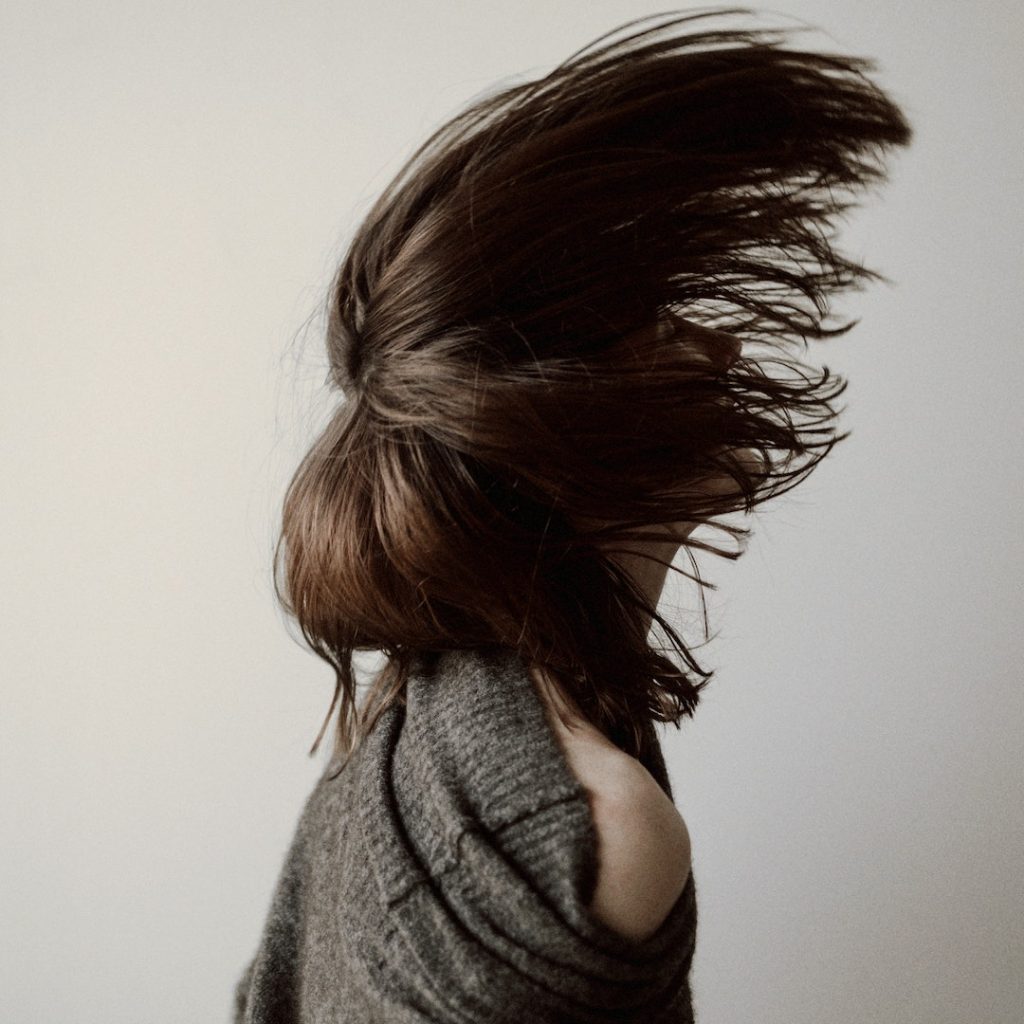
Furthermore, we live in a very ‘visible’ society and the mental effects of hair thinning for women are very real. Scientific research backs this up.
Indeed, a new study has found that most women will lose their hair as they grow older with a detrimental effect on their self-esteem.
The research published in the journal Menopause found that over 52% of women over 50 years old will experience some form of thinning hair or female pattern hair loss.
Of the 200 women studied (aged 50-65), 73.2% had mild hair loss, 33.6% moderate hair loss and 4.3% severe hair loss.
And of those 60% were affected by low self-esteem associated with their hair loss.
According to Dermnet, the evidence confirms that the experience of hair loss is psychologically damaging, causing intense emotional suffering, and often leading to personal, social, and work-related problems.
“The relationship between hair loss and psychosocial consequences may be complicated by hair loss that eventuates from a stressful experience or life event, which then leads to further distress, anxiety, and depression. Women who experience high levels of stress are 11 times more likely to experience hair loss than those who do not report high-stress levels,” they say.
How can you prevent hair thinning and hair loss?
- When it comes to styling less is more – avoid overuse of chemicals and heat treatments.
- Volume-boosting shampoos, conditioners, hair texturisers and volumising mousse can be helpful.
- Eat the rainbow. Good nutrition helps to grow healthy hair so lots of vitamins and minerals, protein, healthy fats and omega-3 fatty acids are essential.
- Take time out to self-nurture, de-stress, move your body, practise mindfulness and vitamin H (humour).
- Try scientifically proven, all-natural LotsaLocks®. (See below.)
RELATED: Science Says Mindfulness Aids Menopausal Signs
Conclusion
If you’ve noticed your hair thinning it’s natural to feel distressed. The research tells the story loud and clear. But the good news is you can take steps to combat menopause hair thinning. Lifestyle changes such as improving your health and the right, proven solutions can significantly minimise the loss.
LotsaLocks® contains keraGEN-IV®, a digestible keratin protein that has been shown in scientific studies to support strong hair follicle anchoring. Subsequently, it supports hair maintenance and density. LotsaLocks™ also contains Biotin, one of the B complex vitamins well known for supporting healthy hair. Learn more.
“Love it! Everybody tells me I look very healthy, and I know it’s because Lotsalocks has improved my hair thickness and skin – it’s glowing! The perfect product for me, hair improved, skin wonderful and nails now much stronger.”
– Ali Q –



